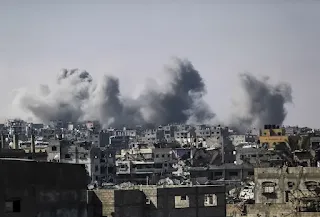This came in a statement issued by the Palestinian Ministry of Foreign Affairs and Expatriates, following a warning issued by the UN program earlier Sunday, calling for "forcing Israel to open the crossings immediately."
"We call on all parties to take the World Food Programme's warning of famine in the Gaza Strip with utmost seriousness," the ministry said.
The United Nations World Food Programme (WFP) said in a post on its X platform that families in Gaza do not know where their next meal will come from, given the stifling blockade imposed on the Strip for more than seven weeks.
The program called on all parties to "prioritize the needs of civilians, protect humanitarian workers, and immediately allow humanitarian aid into Gaza," amid the ongoing Israeli blockade and genocide.
The Foreign Ministry expressed "grave concern and seriousness regarding the worsening and widespread famine in the Gaza Strip, which now threatens the lives of more than two million Palestinians, the majority of whom are displaced, given the lack of income and their complete dependence on humanitarian aid."
The ministry stressed "the importance of the international community responding to the serious warning issued by the World Food Programme regarding the imminent danger threatening the lives of Gaza's residents as the small remaining quantities of food supplies are about to run out."
It called on "all Arab, Islamic, regional, and international parties to take urgent action and utilize all their political and humanitarian influence and weight to compel the occupation authorities to open the crossings immediately."
The ministry called for "ensuring the immediate and sustained flow of humanitarian aid, which would contribute to ending the worsening humanitarian disaster in Gaza."
Since March 2, Israel has closed the Gaza Strip's crossings to the entry of food, relief, medical aid, and goods, causing a significant deterioration in the humanitarian situation for Palestinians, according to government, human rights, and international reports.
Two days ago, the United Nations Relief and Works Agency for Palestine Refugees (UNRWA) said in a report that the Israeli blockade on Gaza, which has been in place for about seven weeks, is "more severe" than the initial period after October 7, 2023.
UNRWA stated that 420,000 people have been displaced again in the Gaza Strip since March 18 due to renewed Israeli attacks.
In early March 2025, the first phase of a ceasefire and prisoner exchange agreement between Hamas and Israel, which had gone into effect on January 19, 2025, concluded with Egyptian and Qatari mediation and American support.
The Palestinian movement adhered to the agreement, but Netanyahu renounced the start of its second phase and resumed the genocide in the Gaza Strip on March 18, in deference to the most extreme faction within his right-wing government, according to Hebrew media.

